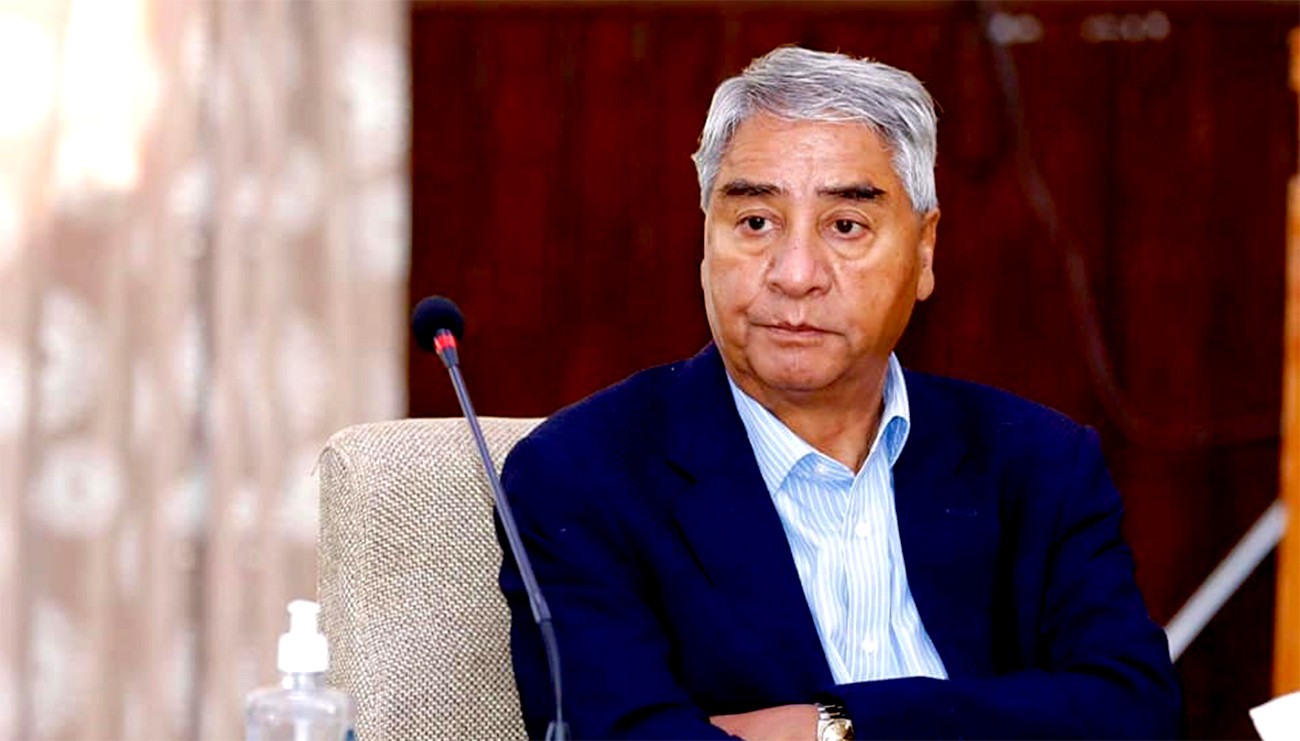The strategy of Nepali Congress (NC) to ratify the Millennium Challenge Corporation (MCC) Compact through the majority of those present on the floor amidst boycott by CPN (Maoist Center) and CPN (Unified Socialist) has failed.
Prime Minister (PM) Sher Bahadur Deuba, CPN (Maoist Center) Chairman Pushpa Kamal Dahal and CPN (Unified Socialist) Chairman Madhav Kumar Nepal had reached a deal on Saturday wherein the two parties would boycott the House proceedings in protest against the MCC Compact and allow its ratification through the majority of those present on the floor.
PM Deuba had accordingly planned to table the MCC Compact in the House on Wednesday. But the parliamentary party meeting of Maoist Center held Wednesday morning decided to quit the government if the government forcibly tries to ratify the MCC Compact without amendment. PM Deuba agreed to not table the MCC Compact in the House as planned earlier on Dahal's request after that.
The recent general convention of Maoist Center had decided that the MCC Compact should not be ratified without amendment and the party leaders put pressure on Dahal to not violate the decision of general convention. Dahal came under additional pressure fearing that the main opposition CPN-UML may also oppose the MCC Compact now.
NC lawmakers have already accused Dahal of betrayal on the issue of MCC pointing that he had promised PM Deuba to help ratification of MCC in return for registering the impeachment motion against Chief Justice (CJ) Cholendra Shumsher Rana despite the grand old party's apprehension against impeaching CJ Rana. "He has been running away now at the time of tabling the MCC after asking us to sign on the impeachment motion against CJ Rana," an NC lawmaker rued after PM Deuba agreed to not table the MCC Compact on Wednesday.
PM Deuba now has three options left to get the MCC Compact ratified.
The first is writing to the MCC Office seeking extension of the deadline until after the election pointing that he failed to get it ratified before the deadline of February end despite his best efforts.
The fact that another coalition partner Janata Samajwadi Party (JSP), that had not opposed MCC until now and was expected to vote in favor, issued a statement on Wednesday saying that it will not take a decision before Maoist Center and Unified Socialist take decision has also compounded matters for Deuba.
America has been stressing that the deadline of February end was set by the joint letter written by PM Deuba and Dahal, and the grant amount of US$ 500 million will be taken back if it is not ratified by February end.
But PM Deuba can still try to convince the US government for yet another extension pointing that there is no way he can get it ratified now.
The second option is talking with the main opposition UML about ratifying the MCC Compact. UML Chairman KP Sharma Oli had registered the MCC Comapct in the House in June 2019 when he was PM and chairman of the then ruling CPN that included current UML, Maoist Center and Unified Socialist.
UML has yet to take official decision on the MCC Compact now and has been pointing that it should first be tabled in the House and the ruling coalition should form its official position on it.
PM Deuba can ask Oli for UML's support to ratify the MCC Compact while remaining in the opposition pointing that he wanted it ratified when he was PM.
The two largest parties constitute a comfortable majority and the MCC Compact will be ratified with support of NC and UML in that case, and the five-party ruling coalition will also remain intact.
But UML, which wants the ruling coalition to not continue until the election, is unlikely to agree for that. UML believes Maoist Center and Unified Socialist will be very weak without support of NC in the election and is trying to break the alliance at any cost. Allowing continuity of the alliance by agreeing to get the MCC Compact ratified would result in political loss and it may, therefore, not agree for that.
The third option for PM Deuba is to break the current ruling coalition and ally with UML to pass the MCC Compact.
UML is likely to agree and may join the Deuba government after passing the MCC Compact in that case. But Deuba personally prefers to ratify the MCC Compact and also continue the current ruling coalition.
He knows that propping up Maoist Center and Unified Socialist through electoral alliance will hurt UML and benefit NC in the election.
He also fears that Maoist Center may ally with UML before the election and the UML-Maoist may again win the election.
Once bitten, twice shy. He has not forgotten how Dahal, who was in the coalition government led by him like now, had allied with UML behind his back before the last election resulting in almost two-third majority for the alliance.
Deuba has to choose one of the three options. The first one is the safest and the third one is the riskiest. He cannot take the decision all alone and will have to discuss seriously in the party.
The ruling coalition will continue if he opts for the safety first approach and chooses the first option.
But if he decides to opt for the riskiest option, Maoist Center and Unified Socialist will suffer the greatest loss. It will be very difficult for the two parties to contest the election against NC and UML remaining outside the government when the stronger parties are in the government.

